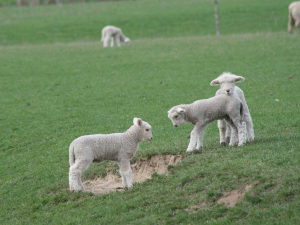M.I.A.
OPINION: The previous government spent too much during the Covid-19 pandemic, despite warnings from officials, according to a briefing released by the Treasury.
 Despite Covid-19 restrictions, farmers achieved a near record lambing percentage according to a B+LNZ report.
Despite Covid-19 restrictions, farmers achieved a near record lambing percentage according to a B+LNZ report.
Despite Covid-19-related processing restrictions and a widespread drought in the first half of 2020, sheep and beef farmers despite achieved a near record 130.3% lambing percentage, slightly lower than spring 2019 where 131% lambing was achieved.
This is the findings of the Beef + Lamb New Zealand (B+LNZ) Lamb Crop Outlook report for 2020 that measures the lambing performance and forecasts lamb and sheep exports for 2021.
Lamb and sheep export volumes, however, are expected to be more significantly impacted by the follow-on impacts of the drought, due to lower animal weights and the retention of sheep for breeding to rebuild stock numbers.
"Despite the challenges of 2020, including drought and Covid-19, sheep farmers demonstrated why they are the world's best," said B+LNZ chief executive Sam McIvor.
"Their resilience and the agility of their farming systems has meant they've performed outstandingly and this should be a real point of pride for our sector," she said.
B+LNZ's Economic Service estimates the number of lambs tailed in spring 2020 decreased by 1.5% or 357,000 head on the previous spring to 22.9 million head.
Most of the decline occurred in the North Island as a result of drought conditions.
McIvor says that although the average lambing percentage is lower, 2019 was a high performing season.
The number of lambs tailed in the North Island declined 4.8% to 10.8 million head.
Restricted feed supplies at mating resulted in lower pregnancy rates when scanning was completed. The severity of the autumn drought on the lamb crop was partially offset, however, by excellent climatic conditions at lambing.
The most severe impact was in the East Coast, with the total lamb crop for the region down 10%.
In contrast, the total number of lambs in the South Island increased 1.6%. Otago was the major driver of the lift in the South Island, recording an increase in total lamb crop of 3.9%.
The total number of lambs processed for export in the 2020-21 season is expected to decrease 4.5% from 19.1 million head in 2019-20 to 18.2 million head.
The annual amount of lamb produced is expected to decrease 4.7% due to a combination of fewer lambs and a slightly lower average carcase weight.
The number of adult sheep processed in the 2020-21 season is expected to decrease 10.8% from 3.5 million head in 2019-20 to 3.2 million head.
The sharp decline by a 16.3% decline in the North Island as sheep farmers after the number of breeding ewes sold in 2020 was higher than expected because of drought.
Controls on the movement of fruit and vegetables in the Auckland suburb of Mt Roskill have been lifted.
Fonterra farmer shareholders and unit holders are in line for another payment in April.
Farmers are being encouraged to take a closer look at the refrigerants running inside their on-farm systems, as international and domestic pressure continues to build on high global warming potential (GWP) 400-series refrigerants.
As expected, Fonterra has lifted its 2025-26 forecast farmgate milk price mid-point to $9.50/kgMS.
Bovonic says a return on investment study has found its automated mastitis detection technology, QuadSense, is delivering financial, labour, and animal-health benefits on New Zealand dairy farms worth an estimated $29,547 per season.
Pāmu has welcomed ten new apprentices into its 2026 intake, marking the second year of a scheme designed to equip the next generation of farmers with the skills, knowledge, and experience needed for a thriving career in agriculture.

OPINION: Here w go: the election date is set for November 7 and the politicians are out of the gate…
OPINION: ECan data was released a few days ago showing Canterbury farmers have made “giant strides on environmental performance”.